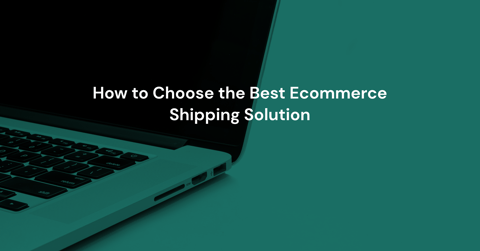How to Choose the Best Ecommerce Shipping Solution

In the online retail landscape, the solution you implement to manage shipping is critical to maintaining a competitive edge. Many businesses have entered the ecommerce space using legacy shipping systems that hinder rather than facilitate growth as consumer habits and expectations evolve. The consequences? Frustrated customers and excessive costs. But the right shipping solution for ecommerce can reduce expenses, optimize performance, and scale effortlessly to meet growing demands.
Let's explore the top factors to consider as you search for the best ecommerce shipping solution for your business.
Key takeaways:
- Modern ecommerce shipping software supports multi-carrier management and real-time analytics, helping businesses cut costs, improve delivery speed, and prevent operation bottlenecks.
- Cloud-based ecommerce shipping solutions ensure fast deployment, reduce IT burdens, and keep your operations flexible to meet changing internal needs.
- Integration with existing systems, like your WMS and OMS, is key to streamlining your logistics and optimizing the fulfillment process.
Selecting the best ecommerce shipping software
Choosing the right ecommerce shipping solution to manage your shipping is a significant long-term decision, so make your selection based on the ability to solve the challenges you currently face while positioning your business to grow with the market.
Here are six key features you should evaluate when comparing shipping software.
1. Cloud infrastructure
Ecommerce is fast-paced and requires a shipping solution built to adapt quickly as the capacity and demands of your business shift. One of the biggest drawbacks of legacy logistics software is that it often requires large budgets and weeks or months-long lead times to implement changes.
Adopting a shipping solution for ecommerce that relies on cloud infrastructure rather than on-site setup offers the following advantages:
- Rapid deployment and updates: Cloud-based solutions are implemented quickly (2-3 months as opposed to 6-12 months) and continuously updated, ensuring your shipping operations stay current without disrupting business.
- Reduced IT burden: Cloud infrastructure enables your team to make strategic pivots in real time and doesn’t require in-house resources to maintain and manage the core functions of your shipping technology.
By leveraging cloud infrastructure, ecommerce businesses ensure their shipping services remain adaptable and efficient, providing a solid foundation for other shipping management functions
2. Self-Serve User Console
The best shipping solutions should be intuitive and flexible. Relying on your vendor to adjust your shipping profile or set up new features and capabilities, which is typical for legacy systems, adds unnecessary complexity and budget.
Instead, focus on selecting a solution that gives you control to manage changes such as:
- Account set up: Create and control user or carrier accounts centrally.
- Package adjustments: Manage the sizes and types of packaging used during your selection process.
- Rules management: Define granular origin details and rulesets for your shipping operations.
-
Rate and surcharge modifications: Set carrier rates and manage accessorial fees and discounts.
- Carrier management: Upload new carrier contracts and manage carriers from a central console.
A self-serve user interface lets you adapt quickly and cost-effectively to your business needs without depending on external support.
3. Carrier network and multi-carrier management
To consistently meet the delivery promises made to your customers, you have to diversify your network. Relying on just one or two carriers can lead to service disruptions, increased costs, and frustrated customer expectations. Multi-carrier shipping introduces complexities, from accurate rate shopping and label management to tracking and visibility.
The best e-commerce shipping software simplifies multi-carrier management with:
- Intelligent carrier selection: Choosing the optimal carrier for each shipment automatically, based on factors such as package dimensions, delivery speed, cost, and carrier performance.
- Extensive carrier network: Accessing a broad range of national, regional, and international carriers to accommodate various shipping needs. At Shipium, for example, 99.2% of North American shipments can be fulfilled through our available carrier network.
- Flexibility to add new carriers: Consider how difficult it is to add new carriers, especially if you’re looking to integrate a new local last-mile delivery service or a niche regional carrier you've used for years. The right technology should simplify that process. For example, at Shipium, if a carrier isn’t in our network, we can integrate them into the platform within eight weeks. A Nucleus Research report found that organizations using our platform eliminated their per-carrier integration cost by $200,000.
4. Order fulfillment optimization
Shipping is one of the most significant expenses for online retail businesses. Your software stack should help your business address common ecommerce fulfillment challenges, such as:
- Logistics complexities
- Inventory management inefficiencies
- Last-mile delivery bottlenecks
By ensuring that your ecommerce shipping solution facilitates order fulfillment optimization, you can:
- Reduce costs: Advanced order orchestration reduces variable and fixed shipping expenses.
- Improve delivery performance: Optimized fulfillment increases speed and accuracy, ensuring deliveries arrive as promised with automated routing and shipping adjustments.
-
Network flexibility: Adaptable strategies help you meet fluctuating business needs, from peak season demands to balancing warehouse and store fulfillment.
Discover how Shipium bridges the gap between systems to optimize your order fulfillment.
5. Integration capabilities
Ecommerce shipping solutions are only as powerful as their accessibility and integration with the technology that powers your entire ecommerce supply chain. When evaluating options, consider
- Compatibility: Ensure the platform can connect seamlessly with your current systems. For example, it should work with your warehouse management system (WMS) to track inventory and facilitate picking and integrate with your order management system (OMS) to coordinate the best ship-from location for each order.
-
API-centric approach: Look for solutions that offer robust, well-documented APIs for flexible integration with your current tech stack and modules that help with everything from cartonization and printing shipping labels to tracking orders.
- Service level agreement (SLA) compliance: Verify that the software offers integrations that uphold your SLAs.
6. Reporting and analytics
You can only optimize your shipping costs if you know how your operations perform. The best ecommerce shipping solutions provide you with detailed, real-time metrics on the following factors:
-
Network and shipping performance: Analyze carrier volume distribution, performance across zones, and efficiency from specific origins, including international shipping.
- Fulfillment performance: Track the efficiency of your shipping from buy-now clicks to final delivery.
- Simulation: Use advanced data modeling techniques to predict the cost and performance impacts of operational changes (e.g., adding a carrier) before making them.
Why is increased visibility into your shipping performance important to your bottom line? In one case study, the eco-friendly consumer product brand Grove Collective uncovered shipping errors costing 15% over rate. By using Shipium to make real-time, data-driven decisions on rates and carriers, they eliminated this unnecessary expense.
Benefits of using the right shipping solution for ecommerce
Choosing the shipping platform that best complements your online store can impact everything from revenue to overall customer satisfaction, profoundly influencing brand loyalty.
Ecommerce shipping solution advantage |
Impact on your business |
|
Cost savings |
Optimize carrier selection, minimize errors, and leverage shipping discounts to reduce expenses.
|
|
Time efficiency |
Automate tasks, streamline your shipping process workflow, and reduce manual data entry to speed up operations.
|
|
Centralized operations |
Manage all shipping activities and multi-channel orders from a single, unified platform.
|
|
Enhanced customer experience |
Provide accurate rates, diverse shipping options, and improved order tracking for better customer shopping experiences.
|
|
Scalability |
Adapt to increased volumes, expand to new markets, and integrate new carriers as your business grows.
|
|
Improved fulfillment processes |
Streamline order routing, enhance pick-and-pack efficiency, and maintain accurate inventory levels across sales channels.
|
Top ecommerce shipping solutions
When selecting the best shipping software for ecommerce, your decision will also largely depend on the volume of shipments your business is handling or forecasting over the next year.
Small-to-medium-sized companies will likely find value using the built-in shipping and fulfillment tools available natively in their Shopify or WooCommerce ecosystem.
If you’re an enterprise ecommerce business, you might want to consider a more robust multi-carrier solution like Shipium, which can complement your existing systems (ERP, OMS, WMS, or TMS) to enhance shipping efficiency while driving down delivery costs by at least 12%. We have established partnerships with the best supply chain tech providers in the industry:
- Blue Yonder: AI-driven supply chain platform that optimizes inventory and distribution through advanced forecasting and planning capabilities.
- Green Mountain Technology: Parcel spend management platform specializing in contract optimization and analytics for high-volume shipping operations.
- Manhattan Associates: Supply chain and commerce platform delivering warehouse management, transportation planning, and order orchestration solutions.
- Körber Supply Chain: Warehouse and supply chain management suite that streamlines fulfillment operations and material handling processes.
- SAP: Integrated ERP system connecting core business processes, including supply chain, procurement, and logistics management.
- Oracle: Cloud-based platform providing solutions for transportation management, global trade, and warehouse operations.
- IBM: Supply chain solution that leverages AI, focusing on logistics optimization, visibility, and analytics-driven decision-making.
If you need help navigating all the vendor options, explore the 2024 Gartner® Market Guide™ for Multi-Carrier Parcel Management Solutions. This report provides an overview of leading vendors — and recognizes Shipium as a representative vendor in the multi-carrier parcel management market.
Shipium is the best shipping software for ecommerce operations
With Shipium, businesses can optimize their operations for speed, cost, and accuracy. We take a modern approach, helping online stores make accurate and aggressive estimated delivery dates, boosting conversions and meeting customer expectations.
Book a demo today and discover why Shipium is the best ecommerce shipping solution.

Diagonal thinker who enjoys hard problems of any variety. Currently employee #5 and the first business hire at Shipium, a Seattle startup founded by Amazon and Zulily vets to help ecommerce companies modernize their supply chains. Previously was CMO at Datica where I helped healthcare developers use the cloud. Prior to that I came up through product and engineering roles. In total, 18 years of experience leading marketing, product, sales, design, operations, and engineering initiatives within cloud-based technology companies.


